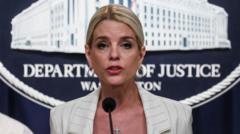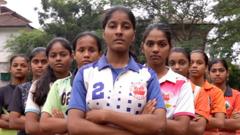With mandatory DNA sex testing on the horizon, track and field becomes the first Olympic sport to adopt such a requirement in an effort to address eligibility controversies.
Mandatory DNA Testing for Female Athletes Introduced in Track and Field

Mandatory DNA Testing for Female Athletes Introduced in Track and Field
World Athletics announces significant policy shift aimed at preserving the integrity of women's sports.
Track and field has made a groundbreaking decision to mandate DNA sex testing for athletes competing in female events, as announced by World Athletics, the sport's governing body. This new policy marks track and field as the inaugural Olympic sport to implement such a regulation, amidst ongoing debates about eligibility criteria for female athletes.
The change comes after a tumultuous year following the 2024 Paris Olympics, which saw heated discussions surrounding the credentials of female competitors, including two boxers who drew scrutiny after winning gold medals. Seb Coe, the president of World Athletics and a former Olympic champion, emphasized that this policy is a necessary step to protect the integrity of women's sports. "We are not simply discussing the integrity of female sports, but ensuring its absolute certainty," he stated during a conference in Nanjing, China.
The testing will be noninvasive, typically involving a cheek swab or dry blood sample, and is expected to be operational by September at the upcoming world championships in Tokyo. Coe argued that these measures are vital for fostering confidence in fair competition, and he remains passionate about defending the female category within athletics.
Despite growing controversies regarding eligibility for transgender athletes—who have been banned from women's events since 2023—the introduction of DNA testing is hoped to settle questions about who qualifies for female competitions, a matter that has deeply divided opinions, especially in public forums and social media.
The change comes after a tumultuous year following the 2024 Paris Olympics, which saw heated discussions surrounding the credentials of female competitors, including two boxers who drew scrutiny after winning gold medals. Seb Coe, the president of World Athletics and a former Olympic champion, emphasized that this policy is a necessary step to protect the integrity of women's sports. "We are not simply discussing the integrity of female sports, but ensuring its absolute certainty," he stated during a conference in Nanjing, China.
The testing will be noninvasive, typically involving a cheek swab or dry blood sample, and is expected to be operational by September at the upcoming world championships in Tokyo. Coe argued that these measures are vital for fostering confidence in fair competition, and he remains passionate about defending the female category within athletics.
Despite growing controversies regarding eligibility for transgender athletes—who have been banned from women's events since 2023—the introduction of DNA testing is hoped to settle questions about who qualifies for female competitions, a matter that has deeply divided opinions, especially in public forums and social media.








